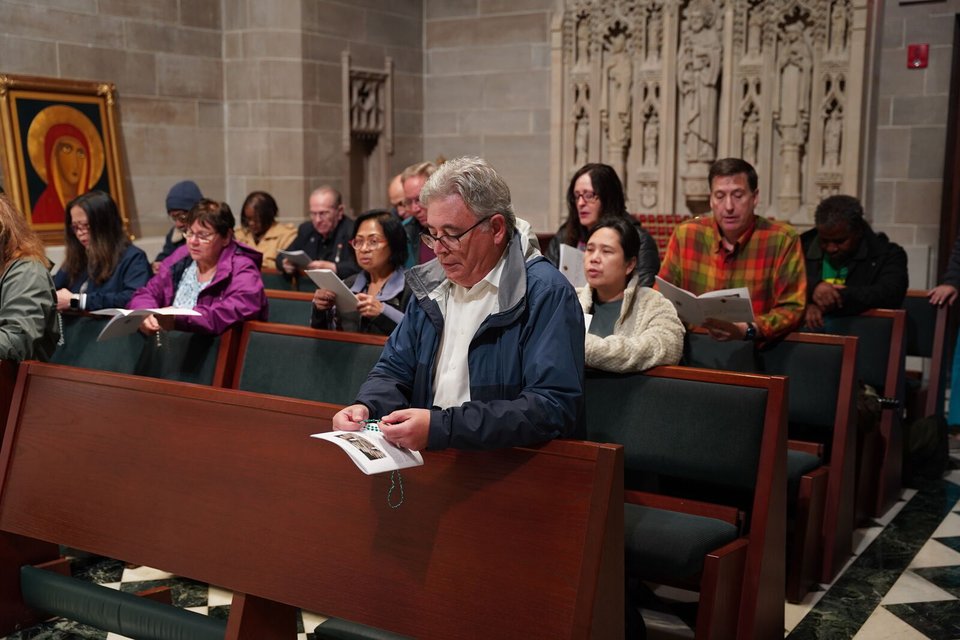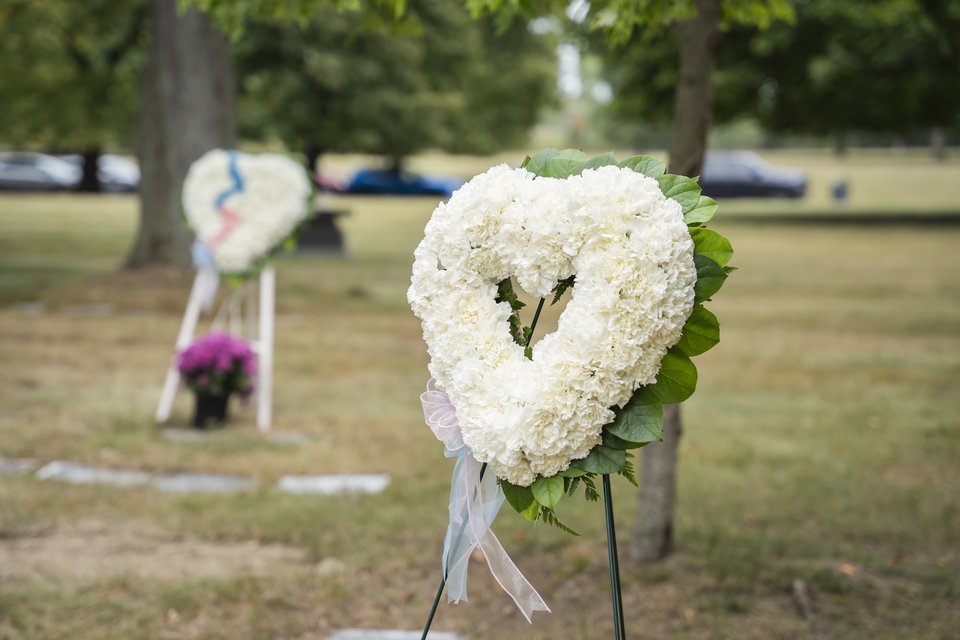New York City-based religious community emphasizes personal accompaniment, merciful response as essential skills
DETROIT — Sisters from the New York City-based Sisters of Life hosted a morning seminar for pro-life ministers across the Archdiocese of Detroit on Oct. 2, sharing strategies and pointers on how best to conduct effective pro-life ministry.
The seminar, hosted at Sacred Heart Major Seminary, allowed the sisters to share best practices from their time in New York and share tips in effective communication, showing empathy and compassion and how best to offer the healing heart of Christ to any pregnant or post-abortive woman who comes into contact with a parish’s pro-life ministry. The next day, the sisters spoke to a gathering of Detroit priests on the same topics.
Sr. Mariana Benedicta Uribe, SV, said it's important that any initial conversation, whether it is someone calling a pregnancy resource hotline or walking into a parish looking for help, needs to be an encounter filled with grace.
“When meeting someone who comes to us for help, I’m meeting them with love. That promises love going forward, and it is an encounter that changes this woman’s life,” Sr. Uribe said. “Over the years, we’ve developed a way in which we listen, a way in which we accompany and let the circumstances unfold, but is open to God’s grace.”

Sr. Uribe presented a video series the sisters developed with the McGrath Institute for Church Life at the University of Notre Dame that explains the sisters’ pro-life ministry — the "Into Life" video series is free for all parishes and pro-life ministries to use.
Sr. Uribe said a big part of their ministry is encountering women who have had abortions and feel a sense of loss and abandonment, not sure where, or if, they can turn for healing.
“A couple months ago there was a woman we were serving from Nicaragua — we’re going to call her Jessica — and she found a video of Cardinal (John) O’Connor (archbishop of New York from 1984 to 2000),” Sr. Uribe said. “She herself had suffered an abortion, and she found this video and heard, ‘We’re not adversaries of the women tempted to have an abortion; not adversaries of the women who had abortions. We’re not adversaries of the men who have abandoned them. They are Christ. They are part of the Body of Christ. Let the Holy Spirit flow through you and heal. Let the ministry of reconciliation go to work. Christ said, 'Pick up the pieces, lest they be lost.’'”
Sr. Uribe said a healing disposition is necessary when it comes to ministering to women who’ve experienced abortion. But that ministry isn’t possible without empathetic communication techniques, which Sr. Therese Marie Saglimbeni, SV, discussed in her presentation.
Sr. Saglimbeni had the group practice active listening, being attentive to what a person has experienced, not questioning or condemning their story, but instead learning to look at the situation from the other person’s point of view, a critical skill not only when it comes to ministering to women facing a crisis pregnancy, but a life skill everyone could use, she said.
Sr. Saglimbeni said just asking a person how they are feeling can radically shape how they feel about themselves and their situation.
“Once, we got a call on the pregnancy helpline (from a woman) saying, ‘Hi, I’m Ashley. I’m four months pregnant. My boyfriend is abusive and my parents kicked me out. Can you help me?’” Sr. Saglimbeni said. “The sister prayed a prayer to the Holy Spirit and said, ‘Ashley, you just found out you’re on your own and pregnant; can I ask you how are you?’

"With this, she started to cry," Sr. Saglimbeni continued. "She said, ‘Sister, did you know that I called six other places, and not one other person asked how I was doing?’
"You can listen a person to life," Sr. Saglimbeni said. "In that moment, a connection was made. When we listen to another person, you learn about her hopes, her dreams, her fears, (and you learn) who is this person that God has intentionally bought before us.”
The sisters also spoke of the wider impact of abortion, including on men and the siblings or grandparents of the children who experience the loss of a family member.
“A man’s experience can be different (depending on) if he was the one forcing the woman to get an abortion, versus a man who didn’t want an abortion, fighting for the life of his child, feeling helpless to save the life of his child,” Sr. Uribe said. “The experiences can vary, but it’s still one of suffering deep loss. It can be one of silence, even more so for men than women. ... Our parishes need to reach out to those men.”
Society's acceptance of abortion has created a pervasive lie that not every life is important, the sisters continued.
“A big reason why (the Sisters of Life) exist is to remind the world of this truth, that every person is unique, is unrepeatable, and that you matter,” said Sr. Mercy Marie Sweeny, SV. “And it’s easy to forget. It’s mysterious we live in a culture where we can forget that we matter. We constantly need to be renewed in this truth, that our life is sacred.

“Abortion is so prevalent that statistically, one in four women will have an abortion by age 45,” Sr. Sweeney said. “Abortion doesn’t have a stereotype; it cuts across every social class, married and unmarried, because it is so accessible and presented as a choice to remove a problem, a solution with no consequences.”
In the aftermath of the passage of Proposal 3 in November 2022, and the possible expansion of abortion via the "Reproductive Health Act" that is making its way through Michigan’s Legislature, Sr. Uribe said ministries such as Walking With Moms in Need and Project Rachel will be all the more important.
But instead of framing abortion as a political issue, Sr. Uribe posed framing abortion as an issue of healing.
“I know you all with Proposal 3 have been in a battleground,” Sr. Uribe said. “But this is not about labels or politics; this is about people. We know as a family we are hurting. As a city, a diocese, a state, we are hurting. There are a lot of people who are hurting, and we need to heal.”
That healing can come from pro-life ministers, who can be the first ones to tell a scared pregnant woman or a mother or father of an aborted baby that they are loved, that they matter and that someone is there for them.
“Every person who ever was, who comes into existence, was chosen by God to be here and is loved,” Sr. Uribe said. “This is astounding, mind-blowing. God loves you. He chooses you. It's not just about the sacredness of life or the devastation that abortion is, but it's about God’s plan of mercy and healing. Because He is holding all of us with His love, and He desires to bring us into the fullness of who we are."
Copy Permalink
Pro-life












